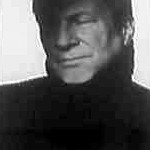The Night of the Hunter/1955/United Artists/93 min.
By Michael Wilmington
Some movies take a while to reach their audiences. Take, for example, Charles Laughton’s great Faulknerian film noir “The Night of the Hunter,” based on Davis Grubb’s Southern Gothic novel.
Beautifully scripted by James Agee, spellbindingly directed by Charles Laughton, evocatively shot by cinematographer Stanley Cortez, and memorably acted by Robert Mitchum (in his best performance), it’s a haunting tale of murder, terror and wild, lyrical flight.
Also unforgettable: the performances by Shelley Winters, Lillian Gish, James Gleason, Evelyn Darden, Don Beddoe, Peter Graves, and two little-known child actors Billy Chapin and Sally Jane Bruce.
In this mesmerizing movie, we see two orphaned West Virginia kids, John and Pearl Harper, desperately fleeing the honey-tongued but murderous preacher Harry Powell (Mitchum), a black-clad, brim-hatted charlatan who has “LOVE” and “HATE” tattooed on his knuckles as props to his sermons. Harry is the Hunter. The children are his prey because they can lead him to the money their father (Graves) stole and managed to hide before he was arrested and executed.
Harry cajoles them, bullies them, then kills their poor, sad, seducible mom Willa (Winters). The heroine of the film is the children’s savior Miss Cooper (Gish). Then close to 60, Gish is eternally enduring, a rustic angel with a hymn on her lips and a rifle in her lap.
John and Pearl escape down the river in an open boat. And for them, the world of the rural South in the Depression becomes a magical twilight of Halloween horrors, a nocturnal landscape of rushing water, moonlit skies, ghostly trees, croaking frogs, watchful owls, pensive rabbits and evil spiders spinning their webs.
As they flee, Preacher Harry follows them on horseback, far-off but omnipresent, a specter etched in silhouette against the evening sky, singing, in Mitchum’s rich, lazy baritone: “Leaning, leaning…Safe and secure from all alarms. Leaning, leaning…Leaning on the everlasting arms.” (You’ll recognize the soothing yet eerie tune; it’s the one threaded through the Coen Brothers’ remake of “True Grit” and sung under the credits.)
Are any classic noir images or sounds more scarily poetic than that flight, that drifting boat, those hands tattooed with “LOVE” and “HATE,“ that black-clad maniac preacher, that spider, that river, that song?
Today, it’s hard to argue that “The Night of the Hunter” isn’t an all-time film classic. But in 1955, audiences rejected it, or more likely, ignored it. Laughton never directed another movie. It was the last script of Agee’s career. Mortality seemed to hang over the movie like Preacher Harry’s shadow.
Laughton modeled the film’s visuals on the silent movies of Gish’s great mentor D. W. Griffith — on their dramatic simplicity and power, and their stark, rich, sensuous imagery. Perhaps part of that unresponsive audience subconsciously objected to the silent-movie influence or maybe they were uneasy with Preacher Harry’s evangelical style and his jocular, one-sided conversations with God, his buddy, to whom he confides all his wicked chicanery. Or maybe they were puzzled by “Hunter’s” unusual mix of artifice and realism, of West Virginia location scenes shot and the Griffith-esque pastoral compositions shot on a California back lot.
“The Night of the Hunter” had to be rescued by television, by revival houses, by movie critics. And it was revived and recalled to life, largely because it’s scary and poetic and smart, a real movie buff’s movie.
Mitchum is incredible in the film. His performance is a nerve-jangling masterpiece spiked full of menace, macabre, off-kilter sexiness and bizarre comedy. When he howls like a wounded beast or banshee chasing the children, or rustically sermonizes (like an evil Andy Griffith), you know you’re watching an actor who has no fear, few limits and no false vanity.
The backstage heroes of the movie, of course, are Laughton and Agee. Superb director, superb writer. Both dead too soon. What a shame so few initially saw their great movie, their wondrous poem of terror, family, false gods, redemption and the river. But “The Night of the Hunter” eventually uncovered all its treasure, and this excellent two-disc Criterion edition, is the trove that proves it.
Extras: Commentary with second unit director Terry Sanders, archivist Robert Gitt, author Preston Neal Jones and my old pal F. X. Feeney. Documentary with Feeney, Jones, Sanders and producer Paul Gregory. Documentary Charles Laughton Directs “The Night of the Hunter” with outtakes and production footage. Video interview with Laughton biographer and actor Simon Callow. Archival documentary with Mitchum. Interview with Cortez. “Ed Sullivan Show” clip with the movie’s stars. Gallery of sketches by Grubb. Trailer. Booklet with fine essays by Terrence Rafferty and Michael Sragow.
You can read more of Michael Wilmington’s reviews at Movie City News.
Author photo by Victor Skrebneski; copyright Victor Skrebneski











From FNB readers